A Comprehensive Guide On Does Super Glue Work On Wood
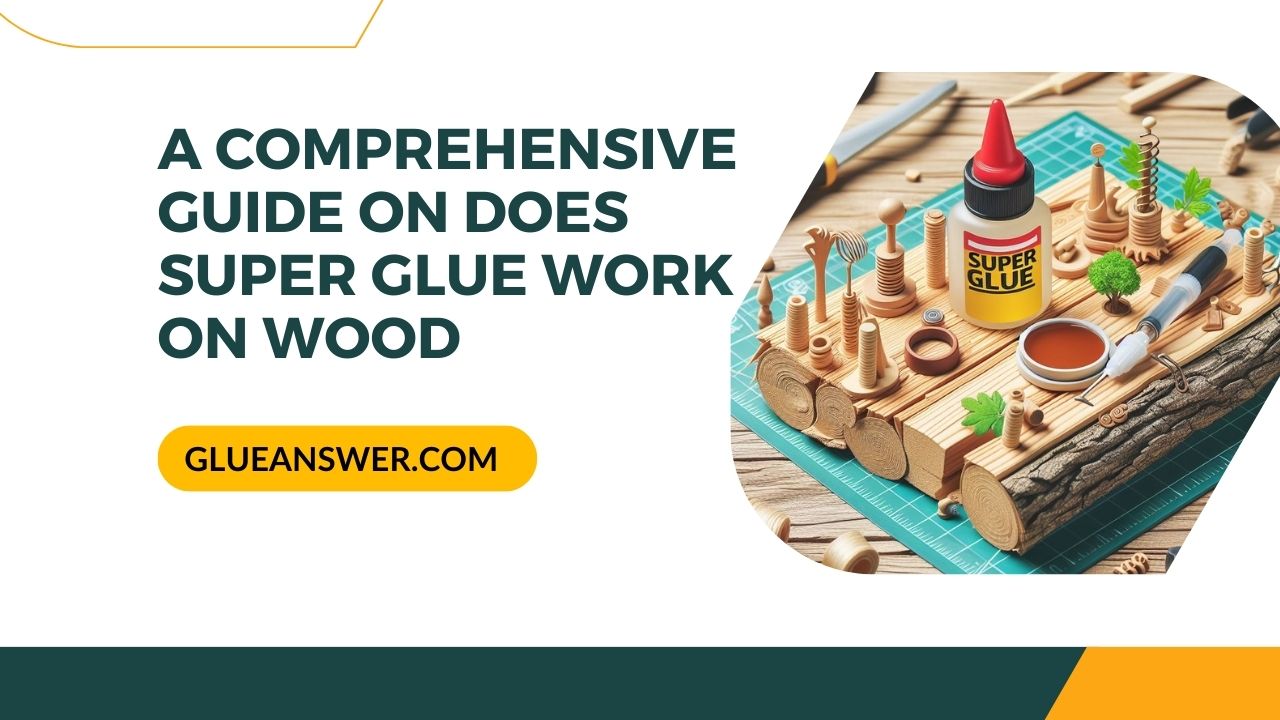
Super glue is one of the versatile glue. It can be used for various purpose. But does super glue work on wood?
Yes, Super Glue, also known as cyanoacrylate adhesive, can work on wood. It forms a strong and fast bond, making it suitable for bonding various materials, including wood. But it’s not always the best or most recommended option.
Here’s a breakdown:
When Super Glue can work:
- Small repairs: For quick fixes of very small cracks, chips, or loose joints, super glue can create a strong, fast bond.
- Awkward shapes: If clamping is difficult or impossible due to the shape of the pieces, super glue’s instant setting can be helpful.
- End grain: Unlike most wood glues, super glue can adhere to end grain wood somewhat effectively.
When Super Glue isn’t ideal:
- Large repairs: Super glue dries brittle and doesn’t have the same gap-filling capabilities as dedicated wood glues. Therefore, it’s not suitable for larger repairs or joints under stress.
- Long-term durability: Super glue’s bond can weaken over time, especially when exposed to moisture or heat. Wood glue typically creates a more durable bond.
- Aesthetics: Super glue dries clear, but the bond line can be visible and leave a white residue. For visible repairs, wood glue often provides a better cosmetic finish.
What Is Super Glue & How Does It Work?
Super glue, also known as cyanoacrylate glue, is a powerful adhesive known for its incredibly fast setting time and strong bond.
The main ingredient in super glue is cyanoacrylate, a type of acrylic resin. This compound exists as a liquid and readily reacts with moisture to form a strong, plastic-like bond.
How it works
When super glue comes into contact with any surface, even minimal amounts of moisture present (from the air, the material itself, or even your fingers) trigger the reaction.
Cyanoacrylate molecules react with water molecules, initiating a rapid chain reaction called polymerization.
As the polymerization progresses, the glue thickens and hardens, forming a plastic-like bond between the adhering surfaces.
Does Super Glue Work On Wood And Metal?
Super glue can work on both wood and metal for small, non-structural repairs due to its fast bond. However, it’s brittle, not moisture-resistant, and difficult to remove, making alternatives like wood glue or epoxy preferable for most projects.
Best Super Glue For Wood
Here are a few options to consider:
1. Starbond EM-02 Super Fast Thin CA Glue
This glue is known for its fast setting time and strong bond. It comes in a thin viscosity, which is ideal for penetrating small cracks and gaps in wood.
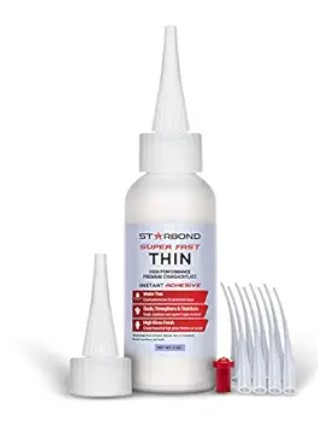
2. Loctite Super Glue Gel Control
This gel formula is less likely to drip or run, making it easier to control during application. It’s also suitable for filling small gaps and cracks.
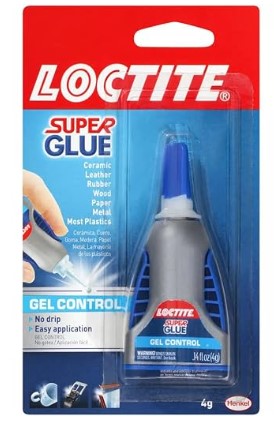
3. Gorilla Super Glue Gel
This is a popular choice for general-purpose bonding, including wood. It offers a good balance of strength and control.
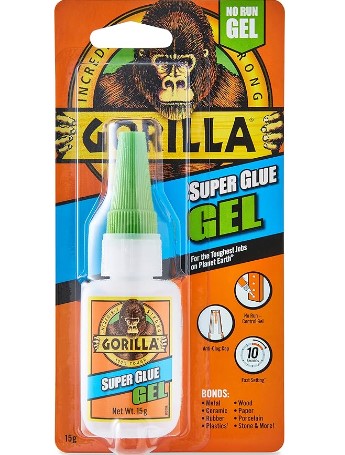
Super Glue For Wood And Plastic
While super glue can bond wood and plastic, it’s not ideal for most applications due to its brittleness, lack of moisture resistance, and difficulty of removal.
How Do You Remove Super Glue From Wood?
Here are a few methods you can try, depending on the severity and your comfort level:
1. Acetone Or Nail Polish Remover (Acetone-Based)
Apply a small amount on a cotton swab and dab gently at the glue. Be careful not to rub, as this can spread the glue. Wipe clean with a damp cloth and repeat if necessary.
2. Vinegar
Soak a cloth in vinegar and apply it to the glue for several minutes. Scrape gently with a plastic putty knife or similar tool. Rinse the area with clean water and dry thoroughly.
3. Heat
Applying gentle heat can soften the glue, making it easier to remove. Use a hairdryer on low heat and hold it a safe distance from the wood. Once the glue softens, scrape it off carefully with a plastic tool.
Read More About Does Super Glue Work On Metal : A Strong and Durable Adhesive Connection
Does Gorila Super Glue Work On Wood?
Gorilla Super Glue can work on wood for small, non-structural repairs due to its fast bond.
Does Loctite Super Glue Work On Wood?
Yes, Loctite Super Glue is suitable for bonding wood. It provides a strong and fast bond, making it effective for various woodworking projects. Ensure the surfaces are clean and fit well for optimal adhesion.
How Long Does Super Glue Last On Wood?
Super glue can last on wood for a long time, typically holding strong for years. However, factors such as exposure to moisture, temperature fluctuations, and the type of wood can affect its longevity.
Does Hot Glue Word On Wood?
Yes, hot glue works on wood for certain woodworking projects. It provides a quick and temporary bond. However, for long-term or load-bearing applications, other wood glues may be more suitable.
Does Super Glue Work On Woodworking?
Yes, Super Glue can be effective in woodworking for bonding wood surfaces. It creates a strong and quick bond, making it suitable for various woodworking applications.
Does Super Glue Work On Wood Table?
Yes, Super Glue can be effective for bonding wood on a table. It forms a strong bond, but ensure the surfaces are clean and fit tightly together for the best results.
Does Super Glue Work On Wood Furniture?
Super glue can work for minor repairs on wood furniture, like small cracks or loose veneer.
What Type Of Adhesive Should I Use To Glue Paper To Wood?
1. PVA Glue
This is the most common and versatile choice. It’s readily available, dries clear, and is relatively inexpensive. Examples include Elmer’s Glue or school glue.
2. Decoupage Medium
This glue is specifically designed for adhering paper to various surfaces, including wood. It often comes in a matte or glossy finish and can add a protective layer to the paper.
3. Spray Adhesive
This option allows for quicker and more even application over larger surfaces. Choose an acid-free formula to prevent paper damage.
Does Super Glue Work On Wood Flooring?
Yes, super glue can be used on wood flooring for small repairs or bonding tasks. However, it is important to use it sparingly, as excess glue may damage the wood finish.
Does Super Glue Work On Wood Cabinets?
Yes, Super Glue can work on wood cabinets for certain repairs. It is effective for bonding wood surfaces together, but the success depends on the specific type of wood and the nature of the repair needed.
What Are The Disadvantages Of Using Super Glue In Woodworking?
Disadvantages that should be considered:
1. Brittleness
Super glue can become brittle over time, especially when exposed to heat and moisture.
2. Limited Gap Filling
Super glue is not ideal for filling gaps or irregularities between surfaces. If there are gaps, other woodworking adhesives like wood glue or epoxy might be more appropriate.
3. Not for Porous Surfaces
Super glue may not bond well with highly porous surfaces. Wood with an open grain or rough texture might not provide the best bonding surface for super glue.
4. Surface Staining
Super glue can leave a white residue on some wood surfaces, particularly if it’s applied in excess.
5. Quick Bonding Time
While the quick bonding time can be an advantage, it can also be a disadvantage if adjustments need to be made after the glue is applied. Once super glue sets, it’s challenging to reposition the bonded pieces.
5.Toxic Fumes
Super glue emits fumes during the curing process, and these fumes can be irritating to the eyes and respiratory system. Adequate ventilation is important when working with super glue.
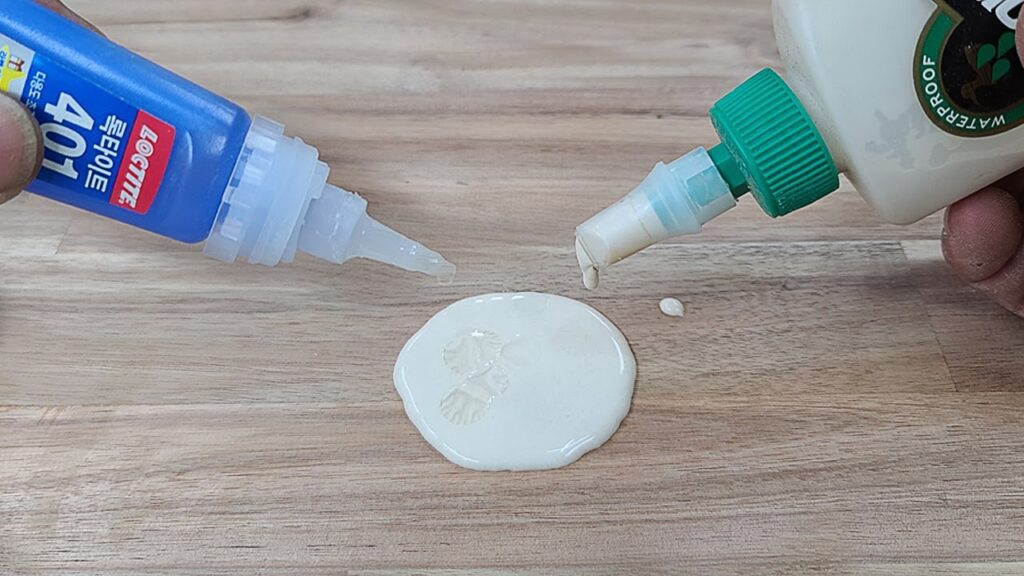
What Is The Best Super Glue For Woodworking?
The Gorilla 6206005 Wood Glue is a popular choice for woodworking projects. It is specifically formulated for bonding wood surfaces, offering a strong and durable bond.
This glue is known for its quick setting time and ability to bond porous and non-porous surfaces, making it suitable for various woodworking applications.
Best Ca Glue For Woodworking
For woodworking, the best CA glue (cyanoacrylate) is typically a medium viscosity variant. Brands like Starbond and Bob Smith Industries offer reliable options. These glues provide a balance between fast bonding and maneuverability.
Finishing Wood With Super Glue
Finishing wood with super glue is generally not recommended due to several drawbacks that can negatively impact the aesthetics and functionality of the finished product. Here’s why:
- Unnatural appearance
- Poor moisture resistance
- Brittleness
- Difficulty of removal
- Limited UV protection
Can You Use Superglue As Wood Glue?
Superglue can work for minor, non-structural wood repairs due to its fast bond. However, it’s generally not ideal for most woodworking due to brittleness and difficulty of removal.
Can Super Glue And Wood Glue Be Used Together?
While it’s technically possible to use super glue and wood glue together, it’s generally not recommended for several reasons:
- The two glues have different chemical compositions and may not adhere well to each other.
- Super glue cures much faster than wood glue, creating an uneven bonding process t.
- Both super glue and wood glue can be extremely challenging and may damage the wood.
Read Also Is Wood Glue And Sawdust Stainable : A Guide to DIY Woodworking
Is Wood Glue Stronger Than Superglue?
While both super glue and wood glue offer strong bonds, wood glue is generally considered stronger for most woodworking applications due to several key factors:
| Feature | Wood Glue | Super Glue |
| Bond strength | Strong and flexible | Strong but brittle |
| Moisture resistance | Good | Poor |
| Gap filling | Effective | Limited |
| Ease of use | Easier | More challenging |
| Cost-effectiveness | More cost-effective | Less cost-effective |
How Long Does Super Glue Take To Set On Wood?
- Setting time: This typically happens within seconds.
- Curing time: It takes 24 hours for super glue to fully cure and reach its maximum strength on wood.
Does Glue Damage Wood?
Glue itself does not inherently damage wood. However, improper use or certain types of glue can cause issues.
What Is Stronger Than Wood Glue?
While wood glue is a strong and versatile adhesive for woodworking, there are several options that offer superior strength in specific situations. Here are some alternatives that can be considered stronger than wood glue:
- Epoxy
- Polyurethane glue:
- Yellow glues
How Long Does Super Glue Take To Dry?
Super Glue typically dries in a matter of minutes, usually within 10 to 30 seconds, depending on the specific formulation and the materials being bonded. However, full curing may take up to 24 hours.
Is Super Glue Really Strong?
Yes, Super Glue, also known as cyanoacrylate adhesive, is known for its strong bonding capabilities. It forms a durable and quick bond, making it effective for various applications.
Why Is Wood Glue So Weak?
It’s important to clarify that wood glue is not inherently weak. In fact, it’s a strong and versatile adhesive widely used in woodworking for various applications. However, it might not be the strongest option in every single situation.
How Permanent Is Wood Glue?
Wood glue, when used correctly, is considered a permanent adhesive. This means it creates a strong bond that is intended to last for a long time, potentially even the lifespan of the project itself.
Why Won’t My Superglue Dry?
If your superglue isn’t drying properly, there could be several reasons behind it:
- Insufficient moisture: Superglue relies on moisture in the air to cure. If the environment is very dry, the curing process can be significantly slowed down or even prevented entirely.
- Excessive glue application: Applying too much glue can create a thicker layer that takes longer to dry due to the limited surface area exposed to air.
- Cold temperature: Superglue cures faster in warm temperatures. Cold temperatures can significantly slow down the curing process.
- Contaminated surfaces: Applying superglue to surfaces with dirt, oil, grease, or moisture can interfere with the curing process.
- Expired glue: Over time, superglue can lose its effectiveness and become slow to cure or fail to cure altogether.
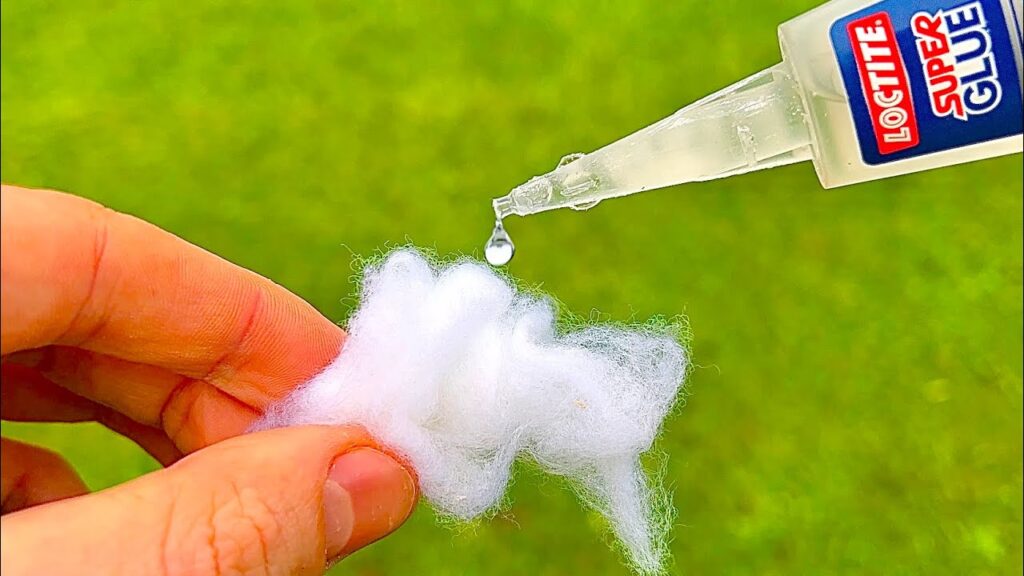
Wood Glue Vs Super Glue
Both wood glue and super glue have their place in woodworking, but they excel in different areas. Here’s a comparison to help you choose the right adhesive for your project:
| Feature | Wood Glue | Super Glue |
| Bond strength | Strong and flexible | Strong but brittle |
| Gap filling | Effective | Limited |
| Drying time | Longer drying time | Sets quickly (within seconds) |
What Is Stronger On Wood: Super Glue Or Elmer’s Glue?
While super glue sets quickly, it’s brittle and not moisture-resistant. Elmer’s glue (wood glue) is generally stronger, more flexible, and moisture-resistant, making it better for most woodworking projects.
How Can You Use Super Glue On Wood?
Here’s a step-by-step guide on how to use super glue on wood:
Step 1: Prepare the Surfaces
Ensure that the surfaces to be bonded are clean, dry, and free from any dust or debris.
Step 2: Apply the Super Glue
Apply a small amount of super glue to one of the surfaces.
Step 3: Press the Surfaces Together
Press the two surfaces together firmly. Hold them in place for the recommended bonding time specified on the super glue packaging.
Step 4: Avoid Movement During Bonding
Try to avoid moving the bonded pieces during the initial bonding period. This helps to ensure a strong and durable bond.
Step 5: Clean Excess Glue
Wipe away any excess glue that squeezes out from the joint. You can use a cloth or a cotton swab moistened with acetone to clean the excess glue.
Step 6: Allow Sufficient Curing Time
Depending on the specific glue and conditions, it may take a few hours to reach maximum strength.
Factors Affecting Super Glue Performance
1. Moisture Availability
Super glue relies on moisture for activation. In very dry environments, the setting time may be slower or incomplete.
2. Surface Contact
The bond strength is influenced by the surface area in contact with the glue. Rougher surfaces provide better adhesion compared to smooth ones.
3. Material Compatibility
While versatile, super glue may not adhere well to all materials. It can react negatively with certain plastics and may not form a durable bond on porous surfaces.
FAQs
What is the fastest super glue?
Gorilla Super Glue is known for its fast bonding, drying in 10-45 seconds. This quick-setting feature makes it one of the fastest super glues available, providing rapid and strong adhesion.
How long does super glue last once applied?
Super glue forms a permanent bond once cured (24 hours), but the container shelf life is limited. Opened containers last 6-8 weeks, while unopened ones can last up to 1 year.
What is better than superglue?
For most purposes, wood glue or epoxy are better than superglue. They offer superior strength, flexibility, moisture resistance, and are easier to use with wood.
Is super glue a permanent fix?
Super glue can provide a strong and durable bond, but it may not be truly permanent. Factors like material compatibility, stress on the bond, and environmental conditions can affect its longevity.
What weakens super glue?
Super glue can be weakened by moisture, extreme temperatures, solvents like acetone, and prolonged stress on the bond. It’s also not ideal for flexible applications due to its brittleness.
Does krazy glue work on wood?
Krazy Glue (super glue) can work for minor, non-structural wood repairs due to its fast bond.
Is fevicol a wood glue?
Yes, Fevicol offers various wood glue options specifically designed for woodworking projects. They provide strong, flexible, and moisture-resistant bonds, making them suitable for most wood gluing applications.
How long does gorilla super glue take to dry?
Gorilla Super Glue is known for its fast-bonding formula, and it typically dries within 10-45 seconds.
Conclusion
The query “Does super glue work on wood?” unveils a powerful adhesive solution for woodworking projects. With its remarkable bonding strength, super glue proves to be a versatile ally in crafting durable and enduring creations.
So, when it comes to joining wood seamlessly, trust in the reliability of super glue for a masterpiece that stands the test of time.






